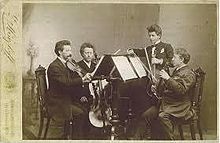Max Brode
Max Brode (born February 25, 1850 in Berlin , † December 29, 1917 in Königsberg i. Pr. ) Was a German violinist and conductor . For over 41 years he shaped the musical life of East Prussia's provincial capital.
Life
Born as the youngest son into a simple Jewish family, Brode was brought up to play the violin by his father at an early age. Heinrich de Ahna was one of his teachers . Paul Mendelssohn took Brode into his care and sent him to Ferdinand David , the concertmaster of the Gewandhaus in Leipzig. There he made music with Franz Liszt and the singer George Henschel , who became a lifelong friend.
After completing his studies, at the age of 19 he accepted a position as the first violinist in a private string quartet in Mitau in Courland . For a long time he lived in Reinhold von Lüdinghausen's house . When Anton Rubinstein heard him there, he advised Brode against a position as concert master at the Mariinsky Theater in St. Petersburg . He recommended him to Joseph Joachim , who had come to the Stern Conservatory in 1866 and in 1869 had become rector of the Royal Academic University for Performing Music in Berlin . At the end of his life (1907), Joachim saw Brode as the best student he had ever had. At the end of the four-year course Brode shone with Joachim's “unplayable” Violin Concerto in D minor, Op. 11 in the Hungarian style . Concerts in Aachen , Augsburg , Vienna , Stuttgart and Frankfurt am Main made Brode famous. In Vienna Johannes Brahms was moved by Brode's personal foreplay.
Contrary to Joachim's advice, Brode accepted a position as the first violin teacher at the Augsburg Music School in 1874. Countess Fugger took him into her house and gave him a Stradivarius violin . In 1876, at the age of 26, Brode came to the Königsberg Opera as concertmaster . Sick of his left hand, he turned to conducting as an autodidact . He put together a small orchestra from his students and cellists , in which the wind instruments were initially replaced by four-handed piano playing . Every Sunday in a small adjoining room of the (new) Königsberg stock exchange was tried . The small orchestra association brought great music to Königsberg for the first time.
Max Staegemann established the tradition of demanding symphony concerts in Königsberg and entrusted Brode with important solo tasks as a violinist. When Staegemann went to Leipzig and the concerts were stopped due to a lack of popularity, Brode picked up the thread again in 1897. He signed a contract with the theater director for the use of the orchestra, for which he recruited musicians from the military orchestras and advanced students. He agreed the use of the trading hall with the merchants. He took care of the correspondence with foreign artists himself. He obtained money from wealthy friends and patrons. Brode's concert series opened with a Beethoven evening. No less a person than Joachim played the most beautiful of all violin concertos , Beethoven's op. 61 . Brode's concerts were a lasting success.
After the death of the music director Heinrich Laudien (1829-1891) Brode took over the Philharmonie . With the amateur orchestra, he successfully performed Brahms' four symphonies and the 9th symphony (Beethoven) .
After the Albertus University in Königsberg had appointed Brode as an academic teacher for the history and theory of music in 1888, he suggested the establishment of a student choir , which he became director. When he was entrusted with the Singakademie directed by Constanz Berneker in 1892 , he was able to start performing great choral works for the first time. If necessary, the men of the student choir strengthened the choirs of the Singakademie. He had a particularly warm relationship with them until his death.
In the 1890s Brode initiated regular string quartet evenings. His Brode Quartet gave concerts for over two decades. The Wendel Quartet also played in Königsberg. He made music with Eugen d'Albert and Anton Rubinstein . Bronisław Huberman sought his advice.
Brode collected postage stamps , coins and antiques . He bought his last Stradivarius in Saint Petersburg from a Baron Vietinghoff for 6,000 marks - without playing it or checking its tone. The appearance alone guaranteed authenticity and excellent quality. At the end of the 19th century, Joachim estimated their value five times as much. In his second marriage he was born with Ellida. Wittich married, who stood by his side until the sudden end of his life and gave him three children, Emilie, Franz, and Marie. Emilie Brode became his talented student. However, she later switched to singing and after her marriage to Norbert von Stetten became known as Emy von Stetten as an oratorio, opera and song singer.
A detailed obituary for Brode appeared on January 20, 1918 in the Sunday paper of the Hartungschen Zeitung .
See also
Web links
Individual evidence
- ^ Joachim's Hungarian Concerto
- ^ Heinrich Julius Laudien - Music Director in Königsberg
- ^ Brode Quartet
- ↑ Wendel Quartet
- ↑ a b Siegfried Stern: Max Brode in memory. (PDF; 61 kB)
| personal data | |
|---|---|
| SURNAME | Brode, Max |
| BRIEF DESCRIPTION | German violinist and conductor |
| DATE OF BIRTH | February 25, 1850 |
| PLACE OF BIRTH | Berlin |
| DATE OF DEATH | December 29, 1917 |
| Place of death | Koenigsberg i. Pr. |

